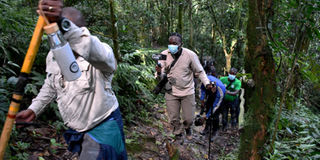Government lays out new approach to tackle rising unemployment

Tourism will be a key focus area as government seeks to change focus on creating employment. PHOTO | FILE
Government will in the next financial year anchor its planning on maximising job creation through tourism, travel, manufacturing, construction, services, and trade.
However, agriculture will continue to be a key area as government seeks to turn it from subsistence to a cash-based sector.
The details are contained in the 2020/21 National Budget Framework Paper drawn by Ministry of Finance.
According to the Ministry of Finance, out of the 9.1 million Ugandans employed outside subsistence agriculture in 2017, which makes up 60 per cent of the working population), majority were in agriculture (3,257,800k, representing 35.8 per cent) followed by the services sector outside trade (2,639,000, representing 29 per cent), trade (2,065,700, translating into 22.7 per cent) and construction (1,137,500; which represents12.5 per cent.
However, government will seek to change this to tilt towards a larger cash economy, a shift away from the subsistence economy that has been prominent since 2017.
“It is clear that millions of persons will still be dependent on traditional agriculture, which requires rethinking of the strategy for greater effectiveness of government interventions,” the Ministry of finance says in the Budget Framework Paper.
Therefore, to reverse the unemployment cycle that has been growing over time, emphasis will be put on Agri-led initiatives that will ensure inclusive growth through strengthening agro-processing and industrial manufacturing as key drivers in the new agenda.
Data in the Budge Framework Paper shows that the share of the labour in paid employment nearly doubled during National Development Plan II , rising from 1 in 10 employed people in the 2015/16 financial year (13.5 per cent) to two out of every 10 employed people (18.1 per cent) in the 2019/20 financial year.
Over the same period, unemployment in the labour force declined by 4 percentage points, from 15 per cent in the 2015/16 financial year to 11 per cent in the 2019/20 financial year.
Through the new initiative, government believes private industries will create more jobs thus lifting pressure on government, amid rising unemployment.
In the 2021/22 Budget Framework Paper, which has already been designed, the Ministry of Finance, said during the 2021/22 financial year, government will undertake measures to support retention and creation of about 500,000 jobs outside subsistence agriculture.
Government, the framework paper notes, will support progressive farmers and nucleus processing facilities in the context of agro-ecological zones, cottage industries and incubation centres and integrated planning and implementation of agricultural sector interventions.
Other interventions will include area-based commodity development, mind-set change and civic education programmes, vocational skills, agribusiness infrastructure development and weather forecast services.
The measures, the framework paper indicates, are expected to create at least 159,202 jobs during the year.
Interventions in tourism
In Tourism and Travel Sector Jobs, according to the Ministry of Finance, interventions will seek to streamline public transport within Greater Kampala Metropolitan Area, extension of concessional loans to tourism enterprises, rolling out of the Smart cities infrastructure, capacity building in the hospitality industry, technology adoption in marketing and sale of tourism products
The interventions are expected to create 28,406 jobs




